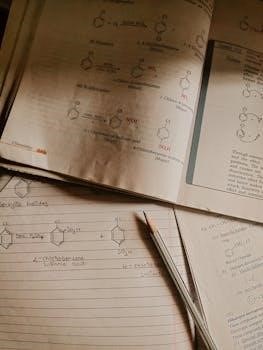
AP Chemistry Review
This section provides a review of key concepts covered in AP Chemistry․ It focuses on material from chapters 1-10‚ preparing you for the final exam․ Reviewing these topics is essential for success․
Key Topics from Chapters 1-10
The initial chapters of your chemistry course are foundational‚ covering essential concepts you’ll need throughout the rest of the semester․ These chapters typically encompass topics such as atomic structure‚ chemical bonding‚ stoichiometry‚ states of matter‚ and basic thermodynamics․ Make sure you understand the periodic table‚ electron configurations‚ and the different types of chemical bonds․ Review balancing chemical equations‚ limiting reactants‚ gas laws‚ and thermochemical principles․ Mastering these fundamentals is crucial for tackling more complex problems later on‚ and they often appear on the final exam․
Chemical Reactions
Understanding how chemical reactions occur is vital․ This section will explore reaction mechanisms and the factors that can influence reaction rates․ This knowledge is key for the final exam․
How Reactions Happen and Affecting Factors
Chemical reactions involve the rearrangement of atoms and molecules․ Several factors influence the speed of these reactions․ Temperature‚ concentration‚ and the presence of catalysts can all play a significant role․ Understanding these factors is crucial for predicting reaction outcomes; Additionally‚ the nature of reactants and their physical states also affect reaction kinetics․ The study of reaction mechanisms helps in understanding how reactants convert to products step-by-step․ Mastering these concepts is vital for exam success‚ as questions often test your ability to apply this knowledge․
Reaction Profiles
Reaction profiles visually represent energy changes during a reaction․ Understanding how to read and create these profiles is essential․ They show activation energy and enthalpy changes․
Reading and Creating Reaction Profiles
Reaction profiles are crucial for understanding chemical kinetics․ These diagrams illustrate the energy changes that occur during a reaction‚ showing the reactants‚ products‚ and transition states․ Learn to interpret the activation energy and enthalpy changes from these profiles․ Practice drawing reaction profiles from given data․ This skill is vital for understanding how reactions proceed and for predicting their rates․ It helps in visualizing the energy barriers that need to be overcome for a reaction to occur․ Mastering this will enhance your problem-solving abilities in chemistry․

ACS General Chemistry Exams
Prepare for the ACS General Chemistry Exams with practice materials․ Find practice exams online for both General Chemistry 1 and 2 to assess your knowledge and readiness for the exam․
Practice Exams for General Chemistry 1 and 2
Utilize practice exams specifically designed for General Chemistry 1 and 2․ These resources are crucial for preparing for the ACS exams․ Engaging with these exams will help you identify areas of weakness and improve your understanding of core chemical principles․ By simulating the actual exam environment‚ you can enhance your test-taking strategies and reduce anxiety․ Consistent practice is key to achieving a strong performance on the final chemistry exam․
Self-Testing
After each study session‚ dedicate 15-20 minutes to self-testing․ This practice helps reinforce learning and identify areas needing more focus․ Practice tests are also useful․
Importance of Self-Testing After Study Sessions
Self-testing is a crucial step in your chemistry exam preparation․ After completing each study session‚ allocate a brief period of 15 to 20 minutes for self-assessment․ This practice aids in solidifying the studied material and pinpointing areas where further review is required․ Engaging in practice tests is also highly beneficial‚ as they mimic the exam environment and help in identifying knowledge gaps; Regular self-testing ensures a more comprehensive understanding of the subject matter․

Exam Tips and Tricks
Optimize your exam performance with these strategies․ Utilize time management techniques and ensure a strong grasp of fundamental concepts for maximum success․ Passing the exam is achievable!
Strategies for Optimal Performance During the Exam
To achieve optimal performance during your chemistry exam‚ focus on time management․ Prioritize questions you know well and return to harder ones later․ A good grasp of the basics is key to success; ensure you understand fundamental concepts; Read each question carefully and show all your work‚ even on multiple-choice questions‚ to avoid simple mistakes․ Stay calm and confident‚ and remember to double-check your answers before submitting the exam․ Utilizing these tips will help you achieve the best possible marks․

Effective Study Techniques
Utilize flashcards for memorization‚ create summaries of key concepts‚ and practice various problem types․ These techniques will enhance your understanding and prepare you for the exam․
Flashcards‚ Summaries‚ and Practice Problems
Effective study techniques for your chemistry final exam include creating flashcards to memorize key terms and reactions․ Summarize each chapter’s main concepts to reinforce understanding․ Practice different types of problems regularly to improve problem-solving skills․ Focus on areas where you struggle․ This approach will help solidify your knowledge․ Regular practice with varied problems is crucial for success․ Make sure to review all your summaries before the exam․ Use flashcards daily for quick review․ These methods will lead to better exam performance․
Virtual Study Groups
Virtual study groups offer valuable support for chemistry exam preparation․ Peer interaction and instructor guidance can enhance understanding․ Collaborating with others can improve your chances of success․
Support from Peers and Instructors
Engaging in virtual study groups provides a platform for collaborative learning‚ allowing students to share insights and clarify doubts․ Interactions with peers foster a supportive environment where different perspectives can enrich understanding of complex chemical concepts․ Furthermore‚ direct access to instructors through virtual platforms enables students to receive personalized guidance and address specific areas of difficulty․ This combination of peer and instructor support is very crucial for comprehensive exam preparation․ Seeking help from instructors ensures that students grasp the fundamentals and are prepared for the final exam․

Exam Pointers for Chapters 12 and 13
This section highlights specific areas within chapters 12 and 13 that require focused review․ These chapters contain material not previously tested‚ so pay close attention to them․
Specific Review of Uncovered Material
Chapters 12 and 13 often present new concepts not previously assessed‚ making a focused review crucial․ Pay special attention to exam pointers for these sections․ Thoroughly go through each exam pointer to solidify your understanding․ These chapters may include complex topics requiring extra practice and review․ Ensure that you clearly understand the fundamentals and application of the material covered in these chapters․ By focusing on the specific exam pointers provided‚ you can ensure comprehensive preparation and better your exam performance․ Don’t overlook this important material․
GCSE Chemistry Past Papers
Engage with quizzes based on GCSE chemistry past papers to enhance your revision․ These questions are suitable for students preparing for chemistry exams and improve problem-solving skills․
Quizzes Based on Past Exam Questions
Using quizzes based on past exam questions is a great way to assess your understanding and preparation․ These quizzes will help you become more familiar with the exam format‚ allowing you to identify areas that require more attention․ By attempting these quizzes‚ you can improve your problem-solving skills and overall confidence․ This strategy will ensure that you are well-prepared for the types of questions that may appear on the actual exam․ Consistent practice with these quizzes can significantly boost your performance․
Stress Management
Exam preparation can be stressful‚ so it’s important to manage this stress effectively․ Implement strategies to avoid procrastination and feelings of helplessness as the exam approaches․
Strategies for Dealing with Exam Preparation Stress
As the final chemistry exam nears‚ feelings of stress can be overwhelming․ It’s crucial to implement effective strategies to manage this anxiety․ Break down study sessions into smaller‚ manageable tasks․ Ensure you get enough sleep‚ eat nutritious meals‚ and incorporate some physical activity into your daily routine․ Time management is key to avoid last-minute cramming․ Consider mindfulness techniques or meditation to help calm your mind․ Remember to take breaks and engage in activities that you enjoy․ Seek support from friends or family if you feel overwhelmed․ These strategies can significantly reduce stress and enhance your exam performance․

